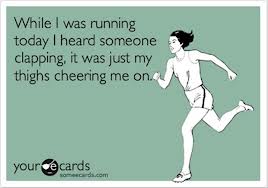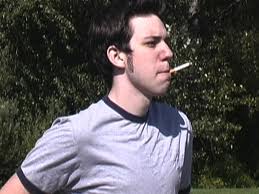I am a runner.
I think a lot about running. Sometimes I think that I am obsessed with it; with the act of it and the thinking about it.
I think about running gear, in particular, wool. I watch runners when we run past each other to check their form, their gear; their mental head-space as if I could ever guess just by looking what that is. I talk to anyone who will listen about running, so that my partner now regularly says, will you please stop talking about running. I slow down as I drive past runners to examine their foot-strikes—heel or forefoot? I fret over women wearing inadequate running bras. I keep a running log detailing the length of my runs, where I went and how I felt. I have a Sunday women’s running group. I think about our run all week and send a group text a day in advance to ‘suggest’ our running route. I read running websites and study other people’s running schedules. I do research in nutrition for runners and routinely change what I eat and drink to see if it makes any difference. I read running books. I taped the London Olympic Women’s Marathon and watched it in real time and cried at the end. A couple of times I’ve asked my friend James to race me up the Tip Track, him on his bike and me running. Both times James gave me a six-minute lead. Both times he won.
One of my favourite books about running is by Christopher McDougall. We’re not related. McDougall’s book, Born to Run, is a bestseller and he’s so famous now I bet he gets paid to talk about running. I bet people stop him mid-run and interview him on their phones and post it on youtube. I’ve got another book that is nearly a thousand pages long, which I’ve read most of. It’s called Lore of Running – it’s a running tome, a reference bible for runners. Lore is written by a South African doctor – Tim Noakes, MD, the cover proclaims – who is a running coach and an experienced ultra-runner. In 2011 Noakes shocked his followers by telling them to rip out his chapter on nutrition and burn it; that after decades of experimenting on himself he’s certain that protein, not carbs, is what runners should be eating. Lore has chapters in it with graphs I don’t understand explaining VO2max which is something to do with how much oxygen you utilise as you run. Your VO2max boils partly down to fitness, but mainly down to being born a certain way. I knew definitively after reading this chapter, even though I didn’t understand the science, that despite there being ample evidence in my thirty-eight years alive to suggest that I will never be an elite runner, that I will never be an elite runner.
I am what you would call an average runner. I don’t go fast, I don’t go slow. I am fitter than people who don’t run, but I am probably the least fittest in a field of fit runners. I love running up hills, but I’m no good at running down. I love running off-road. I don’t like running out-and-backs. I don’t like running on concrete. I don’t like running on athletics tracks. I don’t like running on the flat. I love running in a pack. I like the sounds of the pack’s legs hitting the trail, the rhythm of their foot-strike as they go in and out of time with each other. I like the talking and the silence of the pack. I like it when the pack hunkers down into a northerly gale or up a hill. I like it when someone in the pack strides out and the pack chooses to keep up or to just keep going. I like the moments of unspoken competitiveness in the pack, when one person advances on another, over-takes them or just sits on their shoulder. I like being the last in the pack, knowing that they will stop and wait for me at a certain bend in the trail. I like keeping the last person in the pack company, talking or just being with them, mentally willing them to keep going even though I know they are tired, hung-over, or just over the run. I love it when they do this for me.
People have asked me if I use running time to think about writing. The answer is no. I don’t think about anything when I run.
I have been interested in running for years. When I was young, my father and stepmother ran marathons. In photos of them from the 80s, they wear singlets and tiny, flappy shorts with slits up the side. They look skinny and young. I think there is even a photo of my dad in his running shorts, smoking. They owned a book called The Complete Book of Running by Jim F. Fixx. Its cover is permanently etched in my memory – red background with a side-shot of sinewy legs and flat shoes worn without socks, the type of shoes everyone wore before Nike invented cushioning. I read that book. It had no advice for nine-year-old girls. But it didn’t matter. Like any good book, it’s all in the title – it’s complete – if the answers aren’t here, they aren’t anywhere. Famously, Fixx died of a heart attack after a run.
I was crap at sports when I was a kid. I mean, really crap. Other kids laughed at the way I ran, my legs splayed outwards in the classic kick-back of the over-pronator. I couldn’t catch or throw a ball. I hated team sports, the rules confused me and I got stressed and forgot what I was supposed to be doing. I always got picked last or on a good day, second to last. I sat in the bath at night and relived how crap I’d been and stressed in advance about the next sporting activity I’d be required to take part in. After reading The Complete Book of Running I somehow reasoned that running was something I could become good at if I tried. So I tried and it turned out, despite my bad form, that I was okay. What I mean by okay is that I came seventh. Not last or second to last, but a respectable seventh. I think the only reason I came seventh is through sheer will power and out of desperation for my dignity. That, and The Complete Book of Running. When I ran I liked to visualise the cover legs on Fixx’s book and pretend they were mine.
Somehow running got into my blood, even though I didn’t really do it. When I was eleven I briefly joined a harriers club in Johnsonville. I remember running around and around some streets wondering when the torture would end, and then going back to the club afterwards for uncreamed lamingtons. When on the first day of high school, our form teacher asked us to say something about ourselves and what we liked doing, I panicked. I couldn’t say that I liked reading. I couldn’t be that person anymore. This was an entirely new group of people, they knew nothing about me and how completely hopelessly useless I was at most things. So I said; I like running. My best friend teased me about this for years. At high school most years I competed at inter-schools’ cross country races for which, most years, I’d do a week’s training. Throughout my entire twenties, I ran about five times. Most of these runs were when I lived in Queenstown and would periodically worry about my lifestyle. I ran up the steep streets and people who knew me as someone who hung out in bars, smoking until 4am, would stop in their cars and ask me what I was doing. When I got to 29, my boyfriend suggested to me that for my own health it might be good to occasionally do exercise. I don’t need to, I said. I’ll always be skinny.
Getting skinny, keeping fit, training for a marathon – these are all terrible reasons to run. At least, they have nothing to do with why I run. I also understand why some people hate running. When you’re not running fit, it is hard work, and even when you are running fit, it’s hard work. I’ve done two organized running events in my life and I hated them both. Having said that, I am going to attempt a 60km run in December this year for which I will have to train if I don’t want to die. The difference with this run, as opposed to the other two other events I’ve done, is that this run is up a mountain. Yesterday, while puffing our way up a hill, one of my running pack told me how much she hated running up hills. ‘Not me,’ I said. ‘I LOVE running up hills.’ I meant it. ‘Why?’ she said. I told her it was a woman-against-mountain thing, but I knew as I said it that I was being imprecise.
To write about why I love running, in particular why I love running upwards, is difficult. I need to be doing it, and even then, talking about it would be like ‘dancing about architecture’. I think I’m right in remembering that in his book, What I talk about when I talk about running, Murakami quotes Zappa. Murakami’s book made me think that I would not like Murakami in person – a runner and a novelist. These are two self-centred activities that don’t require community. They require commitment and an absolute dedication to oneself. I thought about this as I read his book, and did not once consider that I too am a runner and a novelist, albeit not as successful at either of these activities as Murakami. Even now I will defend myself by saying, yes, but the difference is that I like running in packs.
I love running because it’s the closest I’ll ever get to flying. I love that I never know until I know whether the run will be good or bad. I love running because sometimes I imagine my feet are wheels and I am spinning along. I love the sweating of running. I love the feeling of newly hatched elastic my legs sometimes have. I love getting by on my own steam. I love switching between feeling that I’m running away from something and running towards something. Sometimes on a final, long hill, my legs get a heaviness as if all the living, moving muscle had been removed and replaced with lead, and it is a total struggle to go on and this makes me imagine what it is to be dead. Sometimes as I run into the exposed, south coast ridge-tops behind my home, as I run away from my home into the hills, I imagine I am running away from civilisation, away from my half-conceived terrible writing, away from my life towards a wild nothing, towards oblivion. And when I get to the top of a hill I stop and turn around and I run back down towards it all, again.
Additional note: I wrote and published this post last night and woke this morning to news of the Boston Marathon bombs. All I can think to say is that an ode is the opposite of a bomb, as is the act of running.




